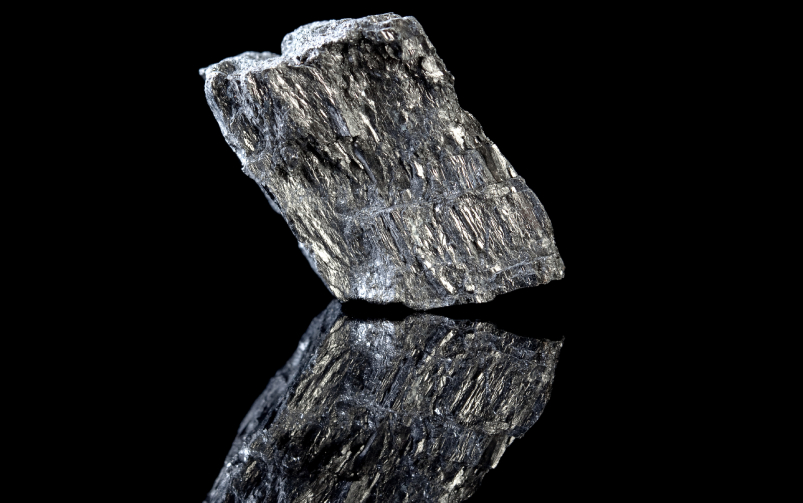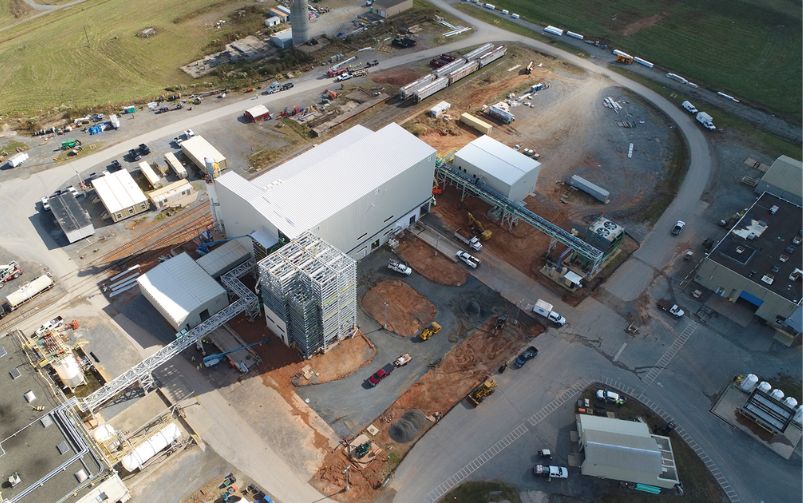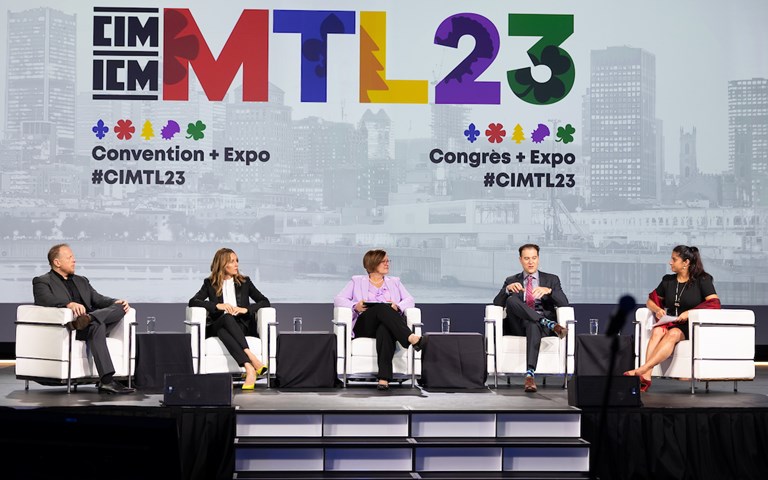(Left to right) Paul Gruner, Belinda Labatte, Milla Craig, Richard Wells and Angelina Mehta at Wednesday's general panel discussion.
Promoting “Brand Canada” or “Team Canada” could help the Canadian mining industry demonstrate its best practices in environmental, social and governance (ESG) when setting up a domestic supply chain for critical minerals, according to panellists at the general session on decarbonization and investment/financing that took place at the 2023 CIM Convention and Expo in Montreal on May 3.
The panellists were Belinda Labatte, CEO of Lomiko Metals; Richard Wells, partner, finance at Kinterra Capital; Milla Craig, founder, president and CEO of Millani Inc.; and Paul Gruner, CEO of Tahltan Nation Development Corporation (TNDC). The moderator was Angelina Mehta, general manager, joint ventures at Rio Tinto Aluminium.
The conversation expanded on Philippe Couillard’s comment from Monday’s plenary discussion about the perception of greenwashing in mining. “The assumption is every company is greenwashing today, and that it’s up to you as an organization to prove otherwise,” said Craig. “It’s no longer just about consumers; investors are making similar assumptions, as are regulators.
"We’ve gone from perhaps too much information to what is now being called ‘green hushing,’ where a lot of organizations are pulling in with their disclosures because of fears of oversight or lawsuits. We’re walking this fine line right now between no one trusting you, and yet you don’t want to put information into the market. It’s a challenging time, and this is why it’s so important to focus on proper reporting so that investors and others can get the information they need to have the proper engagement and dialogue with you.”
Labatte said, “Greenwashing, to me, is the opposite of trust – it’s a lack of it. We have to, as an industry, try very hard to improve our practices… The way to acknowledge that lack of trust is to go back to basic first principles. It starts with personal balance and declaring how you’re going to behave day-to-day in your work and actions – how you’re going to work with First Nations, communities and investors to create a path towards trust.”
The panellists also discussed the benefits of collaboration, which was a major theme of Tuesday’s general panel session. Craig pointed to the Pathways Alliance, where the six major players in oil sands came together, as an example of collaboration in mining. “We know this is a huge challenge,” she said. “I think it’s important that there is a demonstration of that kind of collaboration happening in Canada. I think Canada is in a really strategic position, but we’ve got to work together if we’re going to win this particular game. I think it’s a huge opportunity.”
Wells noted that the time from deposit discovery to a producing mine is very long in Canada. “Time is a big component of making investment decisions,” he said, adding that a company might see the extensive required approvals as an obstacle. “Unfortunately, it may be pushing some companies into areas like China where things happen more quickly,” he said. “I’m not saying that we want to get to the point where everyone can fast track; there’s a reason why the regulations are there. But we also need to think about doing things in a more truncated way.”
Canada is the most well-endowed country in the Western Hemisphere for strategic minerals, according to Labatte. She noted that while automakers want to reduce costs so that consumers can have an affordable car, there is also a need to increase Canada’s geopolitical security and energy resilience.
“This means there is value attributed to [decarbonization], which is a very interesting dynamic between lower prices and valuing your inputs better than you have in the past,” she said. “The past has led us down a path where the cheaper, the better; we have paid for [that access] as a society.”
In Labatte’s opinion, we need to change the metrics around the supply of critical minerals to show consumers the value of a transparent supply chain, adding “the best way to do that – let’s create that Brand Canada for our natural resources that says ‘our product is freakin’ fantastic. It’s responsibly sourced, and it is clean energy, and we’ve done the work with our First Nations and community.’ That is worth something to the automakers and to the consumer.”
Gruner agreed, “I think Canada can be one of the most ethical extractive resource economy countries in the world.” He told the audience about how work he has done in other countries made him appreciate how special the Canadian mining industry is in terms of community engagement, human rights and the environment. “We should be shouting that loud and proud,” he added.
Craig suggested that “Team Canada” could be an alternative to Brand Canada. “We have a Team Canada in hockey who wins the gold medals – maybe we need a transition Team Canada,” she said. “The mining sector needs to be working with the energy sector, with the technology sector. I think that that’s a great call to come out of this; we need a Team Canada.”




